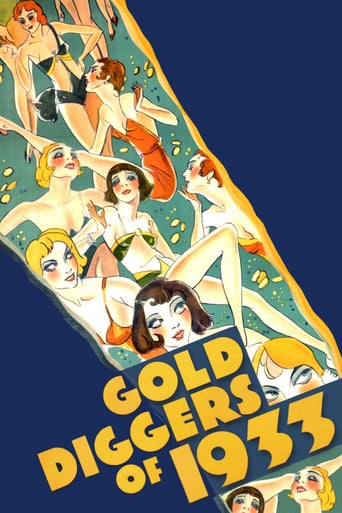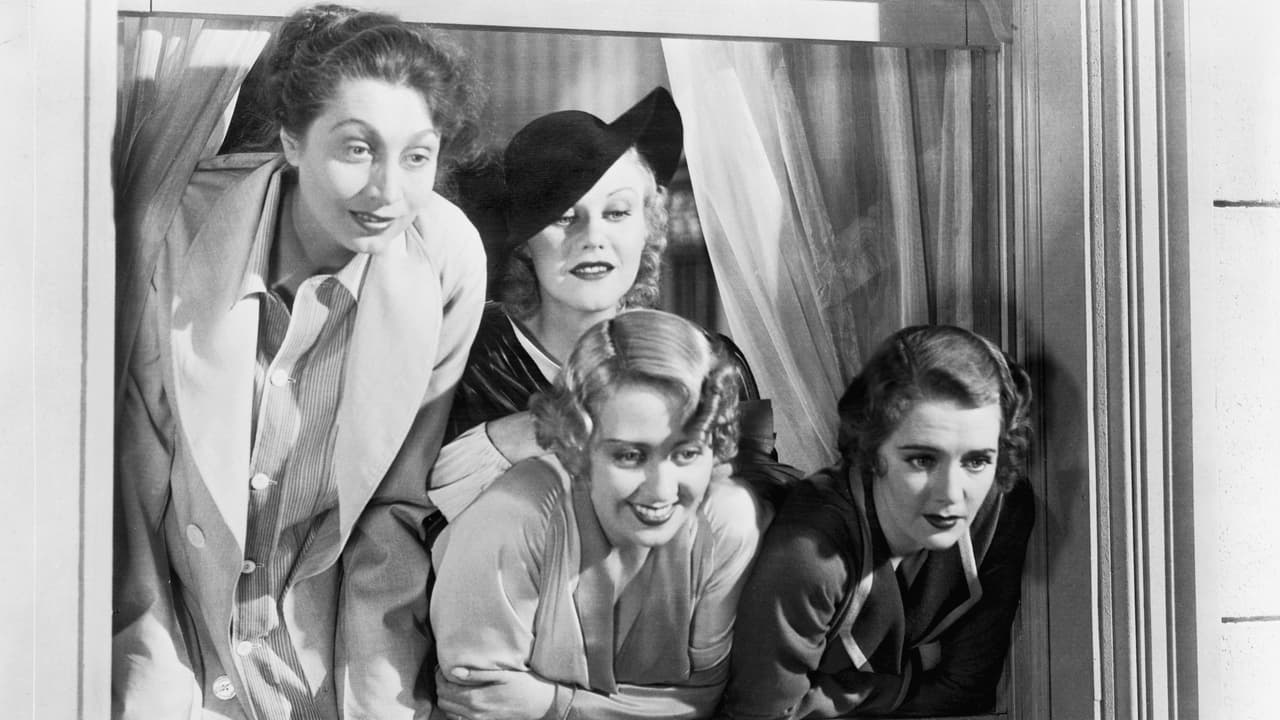vert001
When I'm in the right mood I think of THE GOLD DIGGERS OF 1933 as the best musical ever made. Mostly I find its tonal shifts a bit incoherent for that high honor, but GOLD DIGGERS is at least a strong contender.For my money, a great musical ought to have a great original musical score (sorry SINGING IN THE RAIN) and beyond that ought to be of real interest even in the absence of its music. I don't mean that we're looking for Hamlet or King Lear, such complexity would probably make successful musical integration impossible, but a clever treatment of a solid subject will do. GOLD DIGGERS presents us with a sharp comedy of errors book-ended by a pair of serious production numbers. Probably a unique structure and not entirely successful, but the parts of this structure rarely descend below the marvelous.Maybe only 'We're In The Money' (really titled 'The Gold Digger's Song') can stand alone from the film's score, but Warren and Dubin's other efforts all work perfectly within Berkeley's inspired production numbers. Those numbers are a slight advance on 42nd STREET's, more consistently elaborate and spread out within the picture, which was probably a good idea. The opening number, springing immediately from the opening credits, seems as merry and frivolous as they come until its conclusion is cut off by a sheriff's repossession, giving us a textbook example for the word 'ironic'. There remain serious undertones through the nice expository scenes in the girls' apartment which follow, but the movie soon shifts to pure comedy, and the musical numbers along with it (especially the deliriously surreal 'Pettin' in the Park'). Once the comical confusions have been cleared up the ultimate 'Forgotten Man' number comes nearly out of nowhere (Ned Sparks had given us slight anticipation for it much earlier on). Its relevance to recent events in 1933 is clear (WW I vets had been promised bonuses for their old age. Given the economic circumstances, they had demanded the bonuses immediately and marched on Washington in protest, camping out there for quite some time. Eventually the government ordered the military, under Douglas MacArthur as it happened, to clear them out, and this was done violently. It shook a lot of people up, referenced here by Joan Blondell's memorable glare towards the cop telling the homeless veteran to move on, but it doesn't seem to have much to do with the movie we've just seen so far as I could tell).The Forgotten Man number is brilliant, however, and so had been the movie that we had just watched. Aline MacMahon and Guy Kibbee are particularly funny, Warren William does well in the thankless role of the straight man to everybody's jokes, Ginger Rogers gives further proof of her versatility as she projects pure vanity perfectly. It's unfortunate that she nearly disappears from the movie early on (and for that matter, Keeler practically disappears from it once the Willam/Kibbee-Blondell/MacMahon plot takes center stage). Ginger actually filmed a very bluesy/sad version of 'I've Got To Sing A Torch Song' which must have been meant for sometime around the scene when Trixie threw Fay out of that nightclub for coming on to 'Fanny'. The film seems to have disappeared though for those interested the sound track can be heard on Youtube. It would have given a twist to the character of Fay, a one-noter as she now exists.THE GOLD DIGGERS OF 1933 may not be the best of all possible musicals, but if someone were to ask me for the most representative film from Hollywood in the 1930s, GOLD DIGGERS would be the one.
gavin6942
Millionaire turned composer Brad (Dick Powell) rescues unemployed Broadway people with a new play.You know, I'm very hit and miss on musicals. Some I really like, like "Seven Brides for Seven Brothers". Many more I could probably do without. This one is alright, though it could never be my favorite. The most notable song is "Petting in the Park", which seems rather risqué for the 1930s (but maybe I'm wrong).The only thing really making this film redeeming today is Ginger Rogers. Most of the other actors involved, including Dick Powell, have been largely forgotten. How this film continues to resonate with today's audiences, I have no idea. Most likely it does not.
weezeralfalfa
Surprise!. In contrast to the other musicals in this series of Berkeley-choreographed musicals, this one begins right off featuring Ginger Roger's face filling the screen, singing "We're in the Money". Along with chorus girls, she is decked out in with many silver dollars, and with much oversized replicas of coins decorating their skimpy outfits. or in the background to further emphasize the plentifulness of large coins. The dancers do a few signature Berkeley-styled undulating routines, including a troop standing behind Ginger, invisible, moving their arms up and down, making Ginger look like the Hindu goddess Durga. Ginger's last singing bout sounds like so much gibberish, because it's 'pig Latin', presumably to add a comedic touch....There are 3 more dance productions; one more than the typical Berkeley musical of this series, with "Petting in the Park" around the middle, and the film ending with the other two: an unusual dispersal pattern for a Berkeley film of this series. I think more musicals, through the years, should have copied this format of starting right off with a splashy number. A few did. I can think of "Oklahoma" and "the Sound of Music", with wondrously memorable songs and great singers. The only Astaire & Ginger film, contemporaneous with the present film, that did so was "Follow the Fleet", and is no doubt one reason why I consider that one of my favorites of their films. Unlike the other musicals in this series or any of the Astaire & Ginger films, two of the production numbers relate directly to the poverty of The Depression. The last one, featuring bread lines, distraught wives, and soldiers marching in the rain, and a similarly themed song, dramatizes the misery for many Americans., Actually, this production was originally slated to occur in the middle of the film, so why references to the song("Remember My Forgotten Man"), and plot features are heard there. Berkeley had served in WWI, thus was sympathetic with the 'Bonus Army' of WWI veterans, who were met with physical hostility when they marched on Washington, requesting that their promised 'bonuses', not due until 1945, be paid immediately. This was the main reason for the prominence of army marchers in this production, although mass formations were a stock feature of Berkeley musical productions. Joan Blondell does a fine job in her talking and singing roles in this production, which ends the film."We're in the Money", both the song and the production, also obviously relates to The Depression audiences and to the plot. The lyrics, as well as visuals, try to deny the reality of widespread poverty, and provide hope that this state will soon be replaced by prosperity under the New Deal policies of the incoming FDR administration.(of which Berkeley was a supporter). It also provides ironic contrast to the interruption of this production by police, who have come to push everyone out, because the producer can't pay the rent or other bills. It also relates to the ambition of some of the impoverished chorus girls(played by Joan Blondell and Aline MacNahon) to trick some wealthy unmarried middle-aged men(played by Warren William and Guy Kibbee), who despise gold-digging young women, into buying them expensive gifts, and eventually marrying them. This is the most interesting part of the screenplay for me. Ruby Keeler, another chorus girl, is romanced by songwriter and singer Brad(Dick Powell), who is secretly a wealthy heir, related to the characters played by William and Kibbee. Very surprising to the others, Brad volunteers to supply the money to put on the show. Hence, he is suspected of being a publicized bank robber, for a while.The "Petting in the Park" number was criticized by censors as being lewd, but somehow was retained. It includes the silhouettes of many chorus girls removing their wet clothes, to put on metallic clothes, presumably functioning as chastity belts, until a can opener is produced by a mischievous toddler(midget).The later "Shadow Waltz" number features many chorus girls in hooped skirts supposedly playing neon-lit violins, in various formations, including a violin with bow string, as seen from above: quite a striking and unusual production. In "Gold Diggers of 1935", the violins would be replaced by white pianos.As with the previous "42nd Street", all songs were composed by the Warren-Dubin team. Of these, only "We're in the Money" strikes me as being memorable as a stand alone song.The Dick Powell-Ruby Keeler ingénue romance, tenuously featured in 42nd Street, and again in "Footlight Parade", is placed on more firm footing in this film, and in the later "Dames", usually serving as the vehicle for performing romantic songs not used in the big productions, as well as in some of the big productions. Unlike most of the Astaire & Ginger musicals, there were seldom big ups and downs in their romance, which sometimes was already established before the film began.I would guess Warren William will remind you of John Barrymore. Certainly true for me! Forgotten today, he was then at the peak of his popularity, followed by a rapid decline, having also been a star in the silent film era. His supposed romance with Joan Blondell looks awfully forced!, more so than the supposed Kibbee-MacMahon gold digger romance.
charlytully
Like many of the movies involving Busby Berkeley, the impact made on viewers by GOLD DIGGERS OF 1933 likely will be counter-intuitive. Other than being promised several times earlier in the story, Berkeley's closing ballad of The Forgotten Man has merely a tenuous relationship to the previous 95 percent of this film. Yet it catches the essence not only of its fictional world, but also the flavor of the atrocities waged against ordinary Americans by the Hoover Administration in the early 1930s, as well as the Corporate-purchased U.S. Administrations and Congresses of the 21st Century, which have allowed a concentration of wealth that now exceeds that prompting Theodore Roosevelt to bust the trusts of the Robber Barons even before Teddy's cousin Franklin socialized much of the American economy. Perhaps Berkeley's chief accomplishment was to get his truth into a format entertaining enough to win over not only the public well off enough to be able to spare a dime for the movies, but also the suits at Warner Brothers (though they admittedly WERE notoriously cheap, and consequently always on the look-out for anything sensational). Michael Moore's tirades of today cannot hold a candle to the subtly subversive power of this GOLD DIGGERS, which features sexy girls socking it to the rich guys before standing up and shouting out for their own "forgotten men."



 AD
AD





